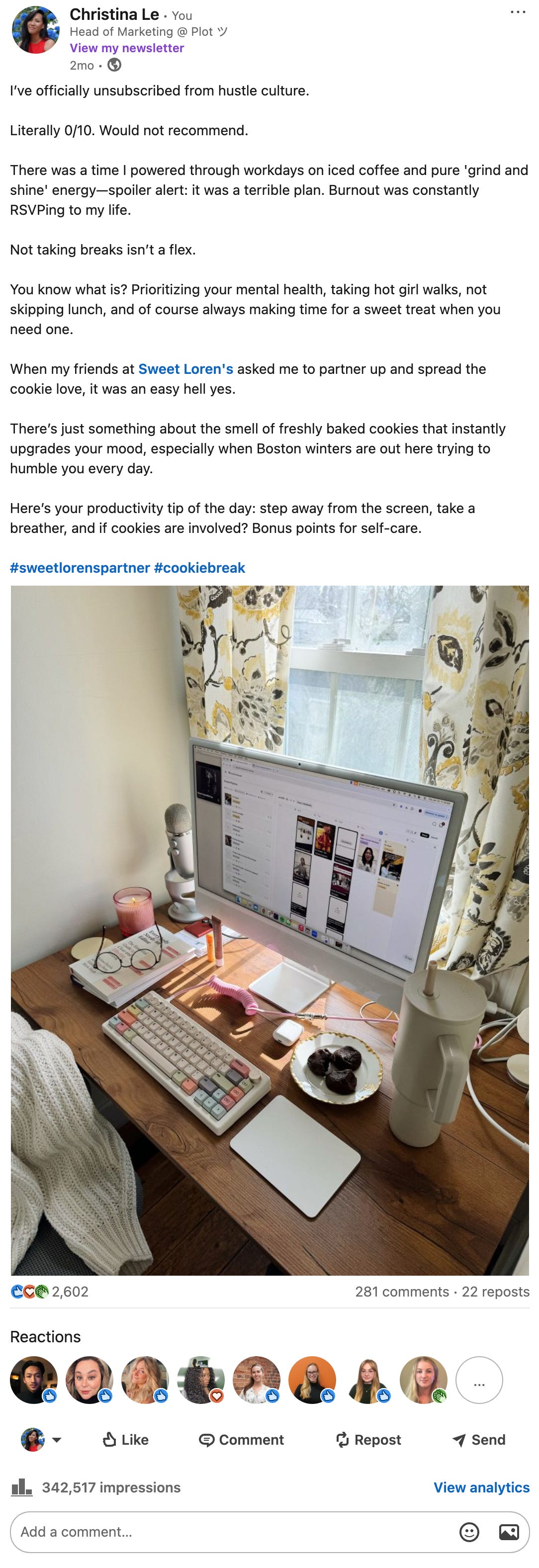The Thin Line Between Boundaries and Ambition
This Isn’t a “Back in My Day” Piece (But Read It Anyway)
It was 8:45 a.m. Five coffee orders were supposed to be in my hands five minutes ago. Instead, I was still planted in line at a painfully slow coffee shop, inching forward while the barista leaned against the counter, deep in conversation with two friends. They were laughing loudly about their weekend, something about Ben saying he wouldn’t show up, and then not only showing up, but arriving very high with a girl no one recognized. I didn’t know Ben. But at that moment, I hated Ben. Because while their gossip spilled freely, so did the minutes I didn’t have.
Back at the office, a 9 a.m. meeting was kicking off. I wasn’t supposed to be in the meeting, but since I was the intern who fetched the coffee, I had earned myself a consistent seat. In the back, quiet, but present. A fly on the wall in a room that could shape my post-college future. I was a junior at the time, and this unpaid internship at the Executive Office of Education felt like my big break. I wasn’t just grabbing lattes. I was basically networking by osmosis, soaking in everything from policy conversations to people dynamics. But right now, none of that mattered if I couldn’t get back in time.
Finally, the barista looked at me. “I’ll take five drinks,” I said, rapid-firing them from memory, the same way I had every week. I didn’t need the notes anymore. I didn’t even blink. Before she could ask, I added, “Yes, I’ll need a tray. One is enough… four on the edges, one in the middle.” She nodded.
I grabbed a fistful of creamers and sugar packets, shoving them into my jacket pocket like a caffeinated raccoon preparing for winter. After what felt like a small eternity, she slid the tray toward me. Everything was snug. Lids on tight. I checked my watch — 8:55. Cue the adrenaline.
The building was just across the street. I booked it, tray in hand, praying I wouldn’t trip on the curb or slam into a pedestrian. At the front door, I jammed the elevator button. It dinged. Miraculously empty.
Up to the 9th floor. Deep breath. In. Out. Doors opened. I slid into the room just as chairs scraped the floor and people started settling in.
Slightly out of breath and only moderately sweaty, I handed off the drinks. Two people smiled. One said thank you. The other two didn’t look up, just gestured to the table in front of them. I placed their coffees down gently, then made my way to the back corner, sat down, and pulled out my notebook.
Showtime—or, intern-time.
Looking Back
I’ve had three internships while working on both my bachelor’s and master’s degrees. I was a legislative aide, a communications writer, and a social media coordinator. And in all of them, it wasn’t the actual job that made the experience valuable. It was observing how people worked—how they pitched ideas, collaborated, solved problems, and earned trust—that gave me the leg up.
Each internship was unpaid, a trade-off for college credit. And none of them felt like they were structured to help me land a full-time job. The best way I can describe it is that I was mostly a glorified office assistant: stapling paperwork, grabbing coffee, jotting down meeting notes, fetching lunch, snapping photos. Honestly, I don’t think anyone planned to give me real responsibility… until I started asking for it.
I’d bug the intern manager (read: my corporate babysitter) to see if there were any projects I could support. Most of the time, when I asked, the answer was yes—and a small sigh of relief. And when it wasn’t, I at least learned what wasn’t on the table yet. But those moments? That’s where I got to actually learn.
It would’ve been easy to clock in, do what I was told, and leave the rest untouched. I was unpaid, after all. But I felt this very real pressure to stand out. The job market was scary—and still is. College is full of people who are smart and capable. What would make me top of mind? What would make someone recommend me for a job?
So I did what I thought was right. I showed up early. I stayed until my manager left. I brought work home, not because I had to, but because I wanted to be better prepared. I studied the workplace, the mission, the values. I wanted people to think of me as someone they could count on—and definitely not just “the intern who grabs coffee.”
The Pendulum Swing
Here’s where the tension lives.
I’ve been very vocal about not subscribing to hustle culture. I don’t believe your identity should be your job. I don’t believe in sacrificing your health, your family, or your worth for a paycheck. That system was broken. It needed to be challenged.
But now I’m seeing something else that’s equally troubling.
I’ve been wrestling with this feeling that the workplace pendulum has swung a bit too hard in the opposite direction. For a long time, hustle culture had us glorifying burnout. Bragging about 70+ hour work weeks. Wearing sleep deprivation like a badge of honor. That era deserved to be dismantled. No argument there.
But now, I think we’re seeing a pretty extreme swing—and I’m not totally sure it’s serving us either.
I still remember the first time someone I worked with mentioned how upset they were that our manager had messaged them after hours. They were genuinely bothered. And I get it—people deserve boundaries, and no one wants to feel like they're on call 24/7. But in my head, I remember thinking, wait… that was a big deal???
I wasn’t defending the message itself. I just didn’t think twice about it. I’m the kind of person who fires off thoughts as they come to mind, not because I expect a reply, but because I’ll forget it otherwise. I’ve since learned to use scheduling tools (a true gift to us chaotic brain dumpers), and I try to be intentional about respecting people’s off hours. But that moment stuck with me—expectations around work are changing, and they’re not as universal as we think.
Another popular refrain I see all over TikTok:
“If they want me to do something outside of my job description, they better compensate me for it.”
And again, I don’t completely disagree. People deserve fair pay and recognition. But sometimes, that line gets blurry. Because in reality, a lot of growth happens just outside your job description. That’s where you stretch, experiment, learn new skills. That’s also where you make yourself indispensable. If everything has to come with a formal line item and a pay bump, it leaves little room for curiosity. Or initiative. Or just… trying stuff.
We all want growth, but sometimes we expect it to come without friction. We want fulfilling careers, but not the parts that feel inconvenient or uncomfortable. And maybe that’s what I’m reacting to. Not necessarily the boundaries themselves, but the subtle message I sometimes hear behind them: I don’t want to do more. I don’t want to be asked. I’m fine where I am.
It’s a lot different from how I used to see opportunity…something I had to actively chase down and prove I was ready for. Not because I was a martyr for unpaid labor, but because I really wanted to earn my seat at the table.
I think the swing away from hustle culture came from a good place. But it might be time for a recalibration. Boundaries are healthy. But so is ambition.
What Effort Actually Looks Like
There’s this idea floating around that you can kind of fake it. Blend in, look busy enough without actually stretching. But anyone who’s managed a team for longer than five minutes can tell you that it’s not slick. We always know who’s putting in the work and who’s just clocking in.
And let me be clear before y’all come @ me: there’s nothing wrong with coasting if that’s what someone wants. Not everyone is trying to sprint toward the next title or raise. Some people are perfectly happy where they are. And I can respect that.
But ambition is a different game.
Ambition, to me, means putting in the effort to fill your own cup. Not necessarily martyrdom or burning out. But being willing to raise your hand, look around the room, ask questions, offer ideas. And doing your actual job really well—and then being curious about what else you can take on.
And I’m going to hold your hand when I say this… but no one is going to stretch their neck out for you just because you’re there. If you’re waiting for someone to “notice your potential” without showing your work, you’re going to be waiting a long time.
You know how every career book ever written says some version of, “Do the job before you have the title”? There’s a reason that advice gets recycled. It works.
We need to reframe around the notion of thinking where this would mean doing more for less. But rather focus about proving that' you’re ready. Earning trust before you’re handed responsibility. And yeah, sometimes that means stepping into ambiguity. Or taking initiative outside your job description.
I wasn’t in charge of strategy in those early roles, but I paid close attention to who was. I’d jot down how they presented ideas, how they handled feedback, how they sold something up the chain. That kind of learning didn’t show up on a resume, but it changed how I carried myself in every job after that.
The people I’ve seen rise fastest weren’t the loudest or the most polished. They were the ones who consistently made themselves useful. Who solved problems without needing to be asked. Who weren’t above doing the small, boring stuff if it helped move things forward. (No joke, I had someone once tell me they weren’t paid to grab coffee—I laughed thinking about my internships.)
Just think about the kind of effort that sticks with people. The kind that makes you top of mind and makes someone say, “we should loop them in.”
Especially in social media, in this economy, with how fast things change—you can’t afford to be passive. You have to be nimble. Proactive. Willing to experiment, fail, and try again. The algorithms change weekly. The tools change monthly. And the only constant is the energy you bring. No one’s going to spoon-feed you a playbook.
Effort isn’t always glamorous. But it can be magnetic.
How Leaders Can Help
I don’t think everything should fall on the individual—especially not junior folks just starting out. That’s not how growth works. And it’s definitely not how leadership works.
When I read The Making of a Manager by Julie Zhuo, there was a line that stuck with me. It wasn’t flashy, but it hit: “Great managers are made, not born.”
If that’s true, then we don’t get to sit back and critique the new wave of workers for not doing things the way we did. We have to ask: What are we doing to shape them?
Like teachers, we have an outsized impact on how someone feels about their role, their growth, and even their potential. That’s a responsibility we shouldn’t take lightly. If someone isn’t showing initiative, is it because they’re lazy? Or is it because we haven’t created an environment where initiative is safe? Or valued? Or even noticed?
We need to reframe how we think about leadership and check our ego and emotions at the door.
Some of the interns and junior teammates I work with now are clearly hungry. Some are still figuring out the rules. Some are just… quiet. And that’s fine. I’m not trying to mold everyone the same way. But I do believe in creating a workplace where effort is noticed, feedback is shared often, and curiosity is rewarded—not shut down by power dynamics or process.
We have to stop babying our interns and start mentoring them.
We have to stop hoarding context and start sharing it.
We have to stop assigning just admin tasks and start inviting people into the why, not just the what.
That’s what passing the torch looks like. Not simply waiting until someone “proves themselves,” but lighting the way a little earlier. Give people the resources, the space, and the encouragement to step into more—and let them surprise you.
The best leaders I’ve worked with didn’t just make room at the table. They pulled out the chair, handed me a notepad, and asked, “so, what do you think?”
That’s the kind of leader I want to be. And the kind I hope we’re all becoming.
Before You Go
Boy, that was a lot. But that’s the thing about reflection…it sneaks up on you.
And you know what? I don’t think my generation worked harder than anyone else. Lord knows the boomers are still crapping on the millennials. We just worked differently. And now things are changing again with this next wave of youngsters entering the market.
I hope we’re not too late to meet somewhere in the middle. Between quiet quitting and overworking. Between boundaries and ambition. Between waiting to be chosen and choosing to step up.
This definitely wasn’t meant to be a “back in my day” piece. It’s more like a “let’s get curious about what effort looks like now” piece.
And if you’re an intern/junior trying to find your way, I hope you’ll consider taking the initiative to fill your own cup, and look for the people who’ll hand you the torch.
And if you’re a manager: be the kind of leader who makes them want to carry it.







Wow, loved reading this. I feel like we’ve gone through similar experiences!
Savoring every single word of this. A) SO beautifully written. (Crying at how familiar/stressful the entire opening story was/is.) and B) This entire thing resonated to my core. Thank you for putting it into words!!!
This line in particular: "We all want growth, but sometimes we expect it to come without friction. We want fulfilling careers, but not the parts that feel inconvenient or uncomfortable. And maybe that’s what I’m reacting to. Not necessarily the boundaries themselves, but the subtle message I sometimes hear behind them: I don’t want to do more. I don’t want to be asked. I’m fine where I am."
It's such a tricky balance and something I'm still wrapping my head around. Agree 100% about the pendulum swing. Thank you for helping give voice to so many of my inner thoughts!